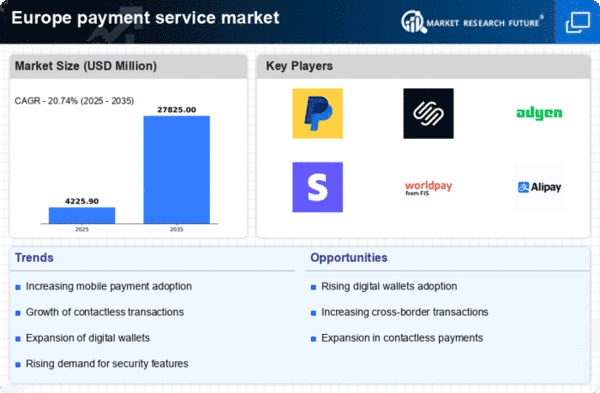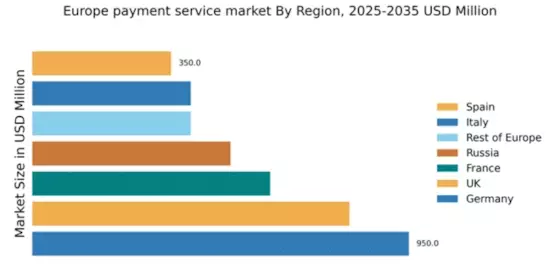Rise of Fintech Companies
The emergence of fintech companies is reshaping the payment service market in Europe, introducing innovative solutions that challenge traditional banking models. These agile startups are leveraging technology to offer faster, cheaper, and more user-friendly payment services. For instance, many fintech firms are providing instant payment solutions that allow consumers to transfer funds in real-time, a feature that traditional banks often struggle to match. The increasing investment in fintech, which reached €10 billion in 2025, underscores the growing confidence in these companies to disrupt the payment service market. As consumers gravitate towards these modern solutions, traditional financial institutions may need to adapt or risk losing market share.
Increased Cross-Border Transactions
The payment service market in Europe is witnessing a notable increase in cross-border transactions, driven by globalization and the expansion of e-commerce. As businesses seek to tap into international markets, the demand for efficient cross-border payment solutions is on the rise. Recent data suggests that cross-border e-commerce sales in Europe are projected to grow by 25% annually, highlighting the need for payment service providers to facilitate seamless transactions across different currencies and regulatory environments. This trend is prompting the development of specialized payment solutions that cater to the complexities of international trade, thereby enhancing the overall efficiency of the payment service market. As a result, companies that can effectively address these challenges may find lucrative opportunities for growth.
Regulatory Changes and Compliance Requirements
The payment service market in Europe is significantly influenced by evolving regulatory frameworks aimed at enhancing consumer protection and promoting fair competition. The implementation of the Revised Payment Services Directive (PSD2) has introduced new compliance requirements for payment service providers, fostering innovation while ensuring security. This directive mandates strong customer authentication, which is likely to reduce fraud rates and increase consumer trust in digital transactions. Additionally, the General Data Protection Regulation (GDPR) has heightened the focus on data privacy, compelling payment service providers to adopt stringent data protection measures. As a result, companies that effectively navigate these regulatory changes may gain a competitive edge, thereby propelling growth in the payment service market.
Technological Advancements in Payment Solutions
The payment service market in Europe is experiencing a surge in technological advancements, which are reshaping the landscape of financial transactions. Innovations such as contactless payments, blockchain technology, and artificial intelligence are enhancing the efficiency and security of payment processes. For instance, the adoption of contactless payment methods has increased by approximately 30% in the last year, indicating a strong consumer preference for quick and seamless transactions. Furthermore, the integration of AI in fraud detection systems is expected to reduce fraudulent activities by up to 40%, thereby boosting consumer confidence in digital payments. These technological developments are not only streamlining operations for businesses but also providing consumers with more convenient and secure payment options, thus driving growth in the payment service market.
Consumer Demand for Seamless Payment Experiences
In the payment service market in Europe, there is a growing consumer demand for seamless and user-friendly payment experiences. As e-commerce continues to flourish, customers increasingly expect quick and hassle-free transactions across various platforms. Research indicates that approximately 70% of consumers abandon their carts due to complicated payment processes, highlighting the need for streamlined solutions. Payment service providers are responding by integrating multiple payment options, including digital wallets and buy-now-pay-later schemes, to cater to diverse consumer preferences. This shift towards convenience is likely to drive customer loyalty and repeat business, ultimately contributing to the expansion of the payment service market.


















